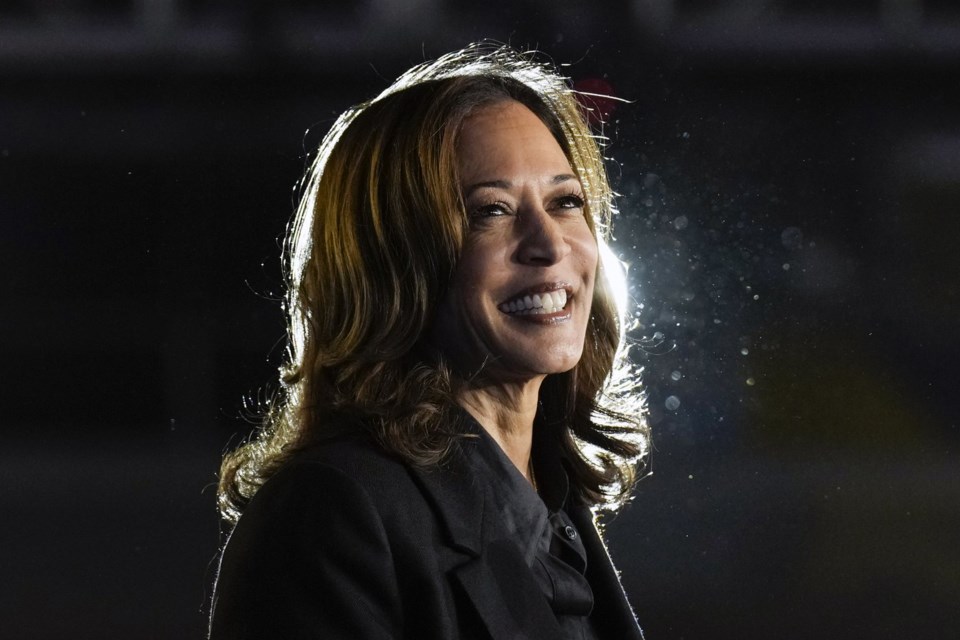PHOENIX (AP) — Vice President Kamala Harris is stepping up her efforts to win over voters who belong to the Church of Jesus Christ of Latter-day Saints, enlisting prominent members of the faith to make the case in pivotal Arizona that Donald Trump does not align with the church's values.
Her state campaign announced on Thursday an advisory committee to formalize the outreach to current and former members of the church, widely known as the Mormon church.
With nearly 450,000 church members in Arizona, about 6% of the state's population, Latter-day Saints and former church members could prove critical in what will likely be an extremely close race.
Latter-day Saints have traditionally voted Republican and are likely to remain part of the GOP coalition. Clustered in solidly Republican states, they have long been a major force in GOP primaries and local politics across the West, but they have not held much sway in national elections. In 2020, about 7 in 10 Mormon voters nationally supported Trump, according to AP VoteCast, while about one-quarter backed Democrat Joe Biden.
Core to Harris’ strategy is preventing Trump from running up big margins with demographic groups that favor him. While she is unlikely to win anything close to a majority of Latter-day Saints, picking up a small share of their votes would make a big difference in a state with a recent history of tight elections. Biden won by just under 10,500 votes in 2020. Democratic Attorney General Kris Mayes won by just 280 in 2022.
Latter-day Saints supporting Harris in Arizona make a faith-based appeal for backing the Democratic ticket despite any reservations, pointing to church teaching that the U.S. Constitution is divinely inspired.
“The Constitution is a tenet of our faith, and we certainly shouldn't be voting for people who have shown a disdain for it,” said Joel John, a former Republican state lawmaker who will serve as a co-chair of the committee. “And we certainly shouldn't be supporting someone who tried to overthrow it on Jan. 6.”
The Salt Lake City-based church does not endorse candidates or political parties, but John said Latter-day Saints are encouraged to elect politicians who are “good, honest and wise." He said those are moral traits that Trump lacks and that transcend any policy differences they might have with Harris, such as her economic plans or position on gun rights.
While many conservative-leaning religious voters warmed to him long ago, Trump has struggled to win over Latter-day Saints. For many members of the church, Trump's penchant for foul language and demeaning rhetoric toward women and people of color clashes with the church's values of humility, morality and compassion.
It has not helped that Trump has feuded with U.S. Sen. Mitt Romney, R-Utah, among the best known members of the church, and former U.S. Sen. Jeff Flake, R-Ariz.
In Arizona, Latter-day Saints make up an outsize share of the population in metro Phoenix's East Valley, a suburban area where ticket-splitting voters have rejected Trump-backed Republicans, helping to push a reliable GOP state into a battleground. Mesa, Arizona's third-largest city with more than 500,000 people, traces its modern history to a settlement founded by pioneers from the faith in the 1800s.
Church members also settled in swaths of rural Arizona and their descendants remain deeply rooted there.
Democratic efforts to woo Latter-day Saints are not new. Hillary Clinton in 2016 drew parallels between Trump's pledge to stop Muslim immigration and the history of religious persecution against Latter-day Saints. Biden went further four years later, investing in organizing church members as Harris is trying to do now.
The “social expectation" for members of the faith to align with conservatives is strong, but Harris has an opening in particular to win over younger Latter-day Saints, who, like the country at large, are more diverse, said Brittany Romanello, an anthropologist and post-doctoral fellow at Arizona State University. Her research includes culture and identity of Latter-day Saints.
“Mormons have been shown to have this attitude that they aren’t just voting based on party affiliation only,” said Romanello, who was raised in the church but is no longer practicing. “They’re voting based on morals.”
Jonathan J. Cooper, The Associated Press




